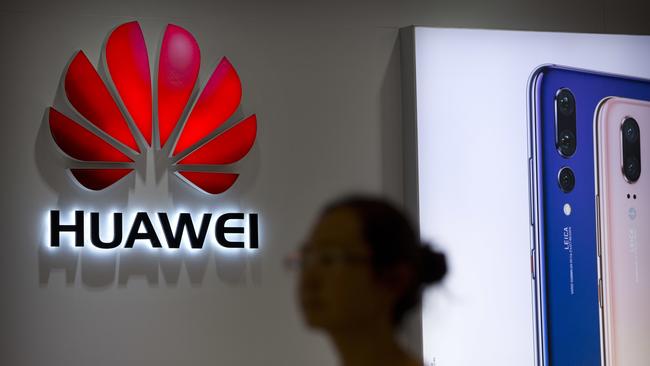Huawei loses business from top UK carrier
BT is removing Huawei equipment from its network’s core, a financial and a symbolic blow for the Chinese company.

Huawei is losing a chunk of business from one of its biggest and oldest Western customers, as the US pushes allies to avoid the Chinese telecom-equipment maker because of national security concerns.
BT Group PLC, Britain’s largest wireless carrier by number of subscribers, is removing Huawei equipment from the core of its network for transferring calls and internet traffic. It said the move was part of a system upgrade that started two years ago, when BT acquired a rival wireless network that used some 10-year-old technology.
The company didn’t say why it was disclosing the removal only now. Earlier this week, the head of Britain’s Secret Intelligence Service said the UK faced a tough call deciding whether it was comfortable using Chinese-made equipment in its telecom networks.
BT said it would continue to buy Huawei equipment for parts of its network outside the core. That would include electronics in cellular towers and sidewalk cabinets.
Huawei remains “an important equipment provider,” the UK company said.
BT’s decision is both a financial and symbolic blow to Huawei, which largely served the Chinese market until the UK became its first major foreign partner almost 15 years ago.
Britain was courting the company fairly recently. In February, Prime Minister Theresa May met Huawei’s chairwoman in Beijing. Days later, Huawei announced it would invest £3 billion ($3.8 billion) in the UK over five years.
The U.S., meanwhile, has long considered Huawei a security threat, saying the Chinese government could compel the company to tap into the electronics it makes to spy, disable communications or launch other cyberattacks on Beijing’s behalf.
Huawei denies this, saying it is an employee-owned company that has never conducted espionage or sabotage for any government, and that it represents no greater threat than competitors because they share a common supply chain.
A Huawei spokesman said BT has long used several equipment suppliers and was simply working to upgrade dated technology. “This is a normal and expected activity, which we understand and fully support.”
The spokesman added that Huawei has “never had a cybersecurity-related incident.”
Huawei is the world’s biggest maker of the equipment that goes into cellular towers, internet networks and related telecom infrastructure, with 22 per cent of the global market in 2017, according to research-firm IHS Markit Ltd.
Finland’s Nokia was No. 2 with 13 per cent, while Sweden’s Ericsson AB was third with 11 per cent. Analysts say those Nordic suppliers, as well as an upstart telecom-equipment business from South Korea’s Samsung Electronics Co., could benefit from Huawei’s challenges.
BT, one of Huawei’s biggest customers outside China, hasn’t disclosed how much it buys from the equipment maker and declined to comment on the cost of stripping out Huawei gear from its core network. Industry experts estimated the cost would be far less than that for replacing equipment on the “edge” of the network, which includes cellular towers.
Over the past year, Washington has made a multipronged push to keep Huawei off American soil. The Wall Street Journal reported in November that the US government had recently launched an outreach campaign to urge allies in Europe and elsewhere to enact similar bans.
“The US advocates for secure telecoms networks and supply chains that are free from suppliers that are subject to foreign government control or undue influence, in order to reduce the risks of unauthorised access and malicious cyberactivity,” a spokesman for the US Embassy in London said Wednesday.
“We routinely urge allies and friends to consider such risks and exercise similar vigilance in ensuring the security of their own telecoms networks and supply chains,” he added.
U.S. officials say the need for vigilance is urgent because wireless carriers worldwide are about to upgrade to 5G, which would accommodate internet connections for many more objects, including factory parts, self-driving cars and everyday devices like heart monitors.
BT said Wednesday it wouldn’t purchase Huawei gear for the core of its 5G network when it starts rolling that out.
In a rare public warning, Alex Younger, the head of Britain’s MI6 intelligence service, said on Monday that banning suspicious telecom equipment from only the core might not be enough to protect a network’s security. That is because with 5G, noncore equipment, such as that in cellular towers, will handle tasks that the core currently handles.
In October, the British government launched a review of its telecom-equipment market that executives said targeted Huawei. It is aiming to finish the assessment by the spring.
In July, the UK government found “shortcomings” with a lab that vets Huawei equipment. Huawei funds and operates the lab, which is overseen by a board that includes British government officials.
In August, Australia banned Huawei and smaller Chinese rival ZTE Corp. from 5G networks, citing security concerns. Last week, New Zealand cited similar concerns in blocking a major wireless carrier from using Huawei for a 5G network. ZTE declined to comment at the time.
The Wall Street Journal



